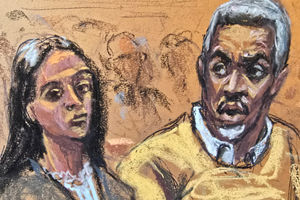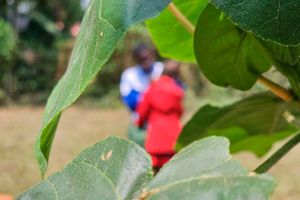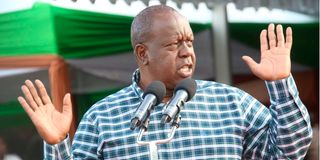
Former Interior Cabinet Secretary Fred Matiang'i addresses a meeting at former Deputy President Rigathi Gachagua residence in Wamunyoro on May 4,2025.
Former Interior Cabinet Secretary Fred Matiang’i now says he is ready to spill the beans on River Yala's extrajudicial killings and the dumping of bodies during his tenure under President Uhuru Kenyatta’s administration.
But he has one condition: that he will not be the only one scrutinised, and that the truth-seeking process be extended all the way back to 1963—and the years after he left office.
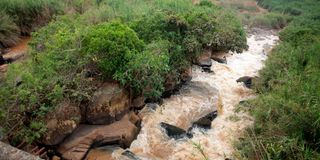
A section of River Yala in Siaya County where several bodies are reported to have been dumped by unknown individuals.
After being named acting Interior CS in December 2015, President Kenyatta formally appointed Dr Matiang’i to the position in January 2018. He served until September 13, 2022, when President William Ruto assumed office.
Dr Matiang’i, widely seen as Mr Kenyatta’s preferred presidential successor ahead of the 2027 General Election, also says he is ready to reveal details about high-profile murders, including those of Sergeant Kipyegon Kenei in 2020, electoral commission ICT manager Chris Msando in 2017, and gold dealer Jacob Juma in 2016.
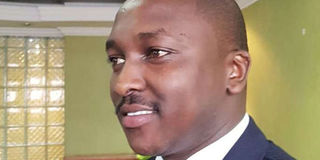
An undated picture of the late Sergeant Kipyegon Kenei, who was attached to DP William Ruto's office. PHOTO | COURTESY
The dumping of bodies in River Yala is believed to have begun in 2019 and peaked in 2022 as President Kenyatta’s term drew to a close.
Sergeant Kenei, who was attached to then Deputy President Ruto’s office, was found dead in his Nairobi home in February 2020. His death was initially ruled a suicide, but the Directorate of Criminal Investigations (DCI) later concluded he was murdered, allegedly in connection with a fake arms deal involving the Deputy President’s office.
The then-DCI Director, George Kinoti, publicly stated that Kenei was killed to protect powerful individuals and to cover up the scandal.
Mr Msando’s body was found on July 29, 2017, along with that of a young woman from Kiambu County, on the outskirts of Nairobi. At the time, he was the head of ICT at the Independent Electoral and Boundaries Commission, and his murder occurred shortly before the 2017 General Election.
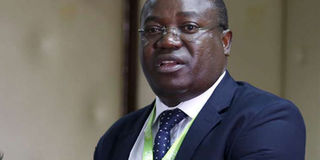
Slain IEBC manager Chris Msando. Investigations into his murder are ongoing. FILE PHOTO | NATION MEDIA GROUP
On May 6, 2016, Jacob Juma’s body was discovered lying in a pool of blood on Ngong Road, Nairobi. His killing followed a period in which he had actively campaigned against high-level corruption.
Dr Matiang’i now says he has much to reveal about these incidents but insists others who served before him must also be held accountable.
“The only way out is being true to ourselves, true to our responsibilities and mandate... doing the right things for our country. We should not confine the information and investigations to recent happenings. Let us go back and have an open public inquest on everything that has happened... Again, 62 years after independence, we should not live like this,” he said in a public statement on June 26, 2025.
He added: “It is only when everything has been heard and resolved that we can have the truth about Msando, Juma, Kenei, and River Yala. Let these things be investigated through an open public inquest so that we can all move forward.”
He decried what he termed a cycle of convenient storytelling and called for its end.
Dr Matiang’i has been openly endorsed by the Jubilee Party—especially by its Secretary-General Jeremiah Kioni—as Mr Kenyatta’s preferred candidate to take on President Ruto in 2027.
He has also aligned himself with the Democracy for Citizens Party (DCP) led by Rigathi Gachagua, and joined other opposition figures including Wiper leader Kalonzo Musyoka, DAP-Kenya boss Eugene Wamalwa and Trans Nzoia Governor George Natembeya in forming an anti-Ruto alliance.
Although Dr Matiang’i has not explicitly declared his 2027 intentions, he has hinted at running for president, with analysts speculating that he might select a running mate from the Mt Kenya region.
However, the legacy of the River Yala killings and other alleged state-sponsored atrocities during his time at the Interior ministry has clouded his public statements, especially among Gen Z voters, whom he seeks to court.
In recent weeks, public backlash followed his remarks about the police killing of teacher and blogger Albert Ojwang in a Nairobi police station, and the shooting of Boniface Kariuki, a mask vendor, in the capital.
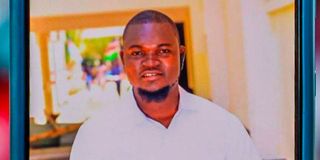
A photo of Voi-based teacher and blogger Albert Ojwang, who died while in police custody.
On Thursday, Dr Matiang’i, flanked by Mr Musyoka and Mr Wamalwa, criticised the killings of at least 15 people during the June 25 countrywide protests in commemoration of those killed in demonstrations in 2024.
He now feels targeted for scrutiny over his human rights record during his time in power.
“I would rather ask myself: can we avoid a recurrence of this? Because this has become our story now. How can we avoid this story? We would rather do other things than spend our time on this,” he said, in a calculated speech suggesting that the problem traces back to independence.
He maintained that while he has his share of revelations to make, others do too.
“In short, what Dr Matiang’i is saying is that he should not be singled out to explain what he sees as a long-standing government culture of killing citizens to maintain power,” says Jomo Kenyatta University of Agriculture and Technology lecturer Charles Mwangi.
On the June 25 protests, Dr Matiang’i said rights violations—including the murder of dissenters—have continued over the years.
“Sometimes, things happen and are later misused for political purposes. For example, Musyoka, Wamalwa and I—standing before you—have all served as Cabinet ministers... Musyoka even as Vice President.”
“We (the three of us) need to be true to our responsibilities, come forward and speak to the public about the information we have so that these things are not used for politics.”
He expressed regret that security matters had become politicised.
“What I used to get from respected elders and security leaders has now been politicised,” he said.
He called for professionalism, transparency, and openness in managing national security:
“We should not limit ourselves to current or recent extrajudicial killings. Let us investigate everything—including past regimes.”
He even named Mr Wamalwa, citing his role on the National Security Council when he served as Defence Minister under President Kenyatta.
“We need to go before a magistrate or judge in an open public inquest and present the facts—the information we have—and let others do the same.”
Dr Matiang’i warned that without truth and justice, Kenya has no viable future.
He added: “We must be open and accountable. We cannot demand responsibility from others when we’re not accountable ourselves. Let us explain what happened—even before my time—so we can move forward as a country.”
He said the Gen Z protests are proof that something is deeply wrong in Kenya.
“When you woke up on the morning of June 26, 2025, after what had happened the previous day, how can you pretend there’s no problem? The sooner we admit it, the better. We cannot manage government by blogging—it doesn’t work like that.”
He urged President Ruto’s government to stop posturing online and address real issues:
“Deal with the lives of our people. We should be afraid. For the first time, Parliament was overrun (in 2024) —and it’s only two kilometres from State House. How did that happen? Who knew what? We have swept too much under the carpet. It’s time to face the truth.”
-Additional reporting by Eric Matara

